On Saturday, September 27, 2014, Emory University Hospital held a Pituitary Education Day. This day of presentations was attended by patients as well as Emory University medical faculty. After the close of the presentations, Dr. Nelson Oyesiku, Professor of Neurological Surgery, Professor of Medicine, Endocrinology, co-director of the Emory Pituitary Center, and a member of the CSRF Medical Advisory Board, was honored as the recipient of the Pituitary Network Association’s “Gentle Giant” Award, for his efforts, commitment and expertise in treating patients with pituitary tumors. A 1776 reception celebrated the over 1776 successful pituitary surgeries that Dr. Oyesiku has performed.
Dr. Nelson Oyesiku opened the presentations by introducing Dr. Edward Laws, Director of the Pituitary and Neuroendocrine Center at Brigham and Women’s Hospital and a CSRF Medical Advisory Board member. In Dr. Oyesiku’s words, Dr. Laws has done “over 5000 pituitary surgeries and is the president of every major neurological society”. Dr. Laws’ talk, titled “Pituitary Centers of Excellence”, discussed the concept and reasons behind a published recommendation to establish Pituitary Centers of Excellence across the USA. (1) A Pituitary Center of Excellence is envisioned to provide multidisciplinary care by highly experienced physicians for pituitary patients across specialties such as, neurosurgery, endocrinology, radiation, ENT, etc., that are “coordinated and efficient, tailored to the needs of the individual.” While a number of excellent pituitary centers exist in the US, some patients are treated at inexperienced institutions regardless of the fact that better outcomes are achieved at centers that have a larger patient volume, experience and historical data. Ultimately, the point was driven home when Dr. Laws said, “It’s just not right that some places are making decisions based on five or six cases”. Dr. Laws said that getting restored to normal hormone health is possible with the help of experienced experts. Research continues in the area for better imaging and medical treatments for pituitary tumors.
The next presentation, titled “”Pituitary Centers of Excellence: A Case Testimony from the Patient Perspective” was presented by Thomas Gordon, Professor Emeritus from Emory University, whose daughter developed Cushing’s disease and suffered for three years before a diagnosis was finally made. Dr. Gordon and his wife Deborah Gust are both scientists, so after their daughter had surgery, they looked back on the process and wrote a journal article entitled “Late Diagnosis of Cushing’s Disease in a Child: What Lessons Can Be Learned?” (2) Even after their daughter clearly displayed symptoms of Cushing’s, they experienced problems with testing guidelines not being followed, delayed testing, misinterpreted communications, little credence given to parental input, and a focus on what was absent rather than what was present. At an envisioned Pituitary Center of Excellence, physicians would have the necessary experience to work together, thus avoiding diagnosis delays.
Dr. Leland Graves, III, from the University of Kansas Medical Center followed with a presentation on the epidemiology and evaluation of pituitary tumors. He stated that because the University of Kansas does not have a lot of expertise, patients are usually sent to Atlanta or Boston. Dr. Graves said that fairly frequently pituitary tumors show up on imaging when looking for something else. Tumors without clinical symptoms are called incidentalomas. According to Dr. Graves, pituitary incidentalomas are found in 4%–20% of computed tomography (CT) scans and 10%–38% of magnetic resonance imaging scans (MRIs), and studies suggest that 5%–10% of the population may have one. This known fact in the medical community, may contribute to the hesitancy of doctors to consider a rare disorder when a pituitary tumor is found. Dr. Graves also stated that small tumors (< 10 mm) often grow slowly, so it is not uncommon to just “observe and track” these tumors unless they begin to cause problems.
Dr. Adriana Ioachimescu, Neuro-Endocrinologist and Co-Director of Emory’s Pituitary Center, took the stage next to discuss the history of pituitary research at Emory. Emory has more than 50 years of uninterrupted care and research on pituitary disorders and more than 3,000 surgeries performed. Before Dr. Nelson Oyesiku, Dr. George Tindall, a neurosurgeon, performed more than 1,500 pituitary surgeries between 1972–1994. In 1992, Dr. Oyesiku began a human pituitary tumor bank, which now has over 600 samples. A year later he began a clinical database of over 1,700 patients to help track them after surgery. Dr. Ioachimescu said, “Research begins with questions asked by patients and physicians and after physical observations.” Ongoing research is being conducted in many areas, including vocal assessment in patients with Cushing’s and acromegaly, growth hormone deficiency in veterans with traumatic brain injuries and participation in a number of clinical trials for improved treatments.
The Cushing’s Support and Research Foundation’s (CSRF’s) very own Ellen Whitton followed with a reflection on the technological advances that would astound Dr. Cushing today, including MRIs and Inferior Petrosal Sinus Sampling (IPSS). He would be amazed by the Internet and the ability to form communities across states, countries, and the globe, to provide support and share information. It is a nearly unanimous belief among those of us who have suffered from Cushing’s that the number of cases is much larger than currently reported in the literature. One misdiagnosis in the beginning can derail a patient for years. The CSRF, established by Louise Pace in 1995, was formed to fill the need of providing reliable information to Cushing’s patients and increasing the awareness of Cushing’s in the medical community and general public.
Up next was Trey Sivley, Esq., the Division Director for the Georgia Department of Insurance, who talked about how difficult it was to come up with standards for insurance. While many pituitary patients would like to be treated at major centers, often insurance companies will insist that the patient stays “in network” even though appropriate expertise does not exist in the network.
Lauren Clepper DeFife, Med, CF-SLP, Department of Rehabilitation Therapy, Atlanta Medical Center, discussed navigating the cognitive and emotional challenges in pituitary disorders. She was quick to point out that a good quality of life does not mean that you are 100% happy; it means that you have the freedom to live your life according to your core values and goals. Pituitary disorders can lead to complications when integrating attention, memory, and executive function; the cognitive subsystems required for functional tasks. When one or more of these elements is impaired or absent, quality of life is affected. Even cognitive deficits that are relatively mild can be devastating to those experiencing them for the first time.
Dr. DeFife said that cognitive symptoms often persist long-term despite optimal surgical treatment, but cognitive rehabilitation is an area that could be helpful. Environments can be structured in ways that help to identify and resolve problem issues. Areas of weakness can be helped with retraining. There are four principals to this practice: focus on functional tasks; practice skills in hierarchy of difficulty; stay in the moment and watch things evolve in real time; and promote self-awareness and self-advocacy. The cognitive rehabilitation team may consist of clinical neuropsychologists, speech language pathologists, and occupational therapists in collaboration with the existing medical team.
Most patients with Cushing’s have reason to be concerned about their psychological well-being. Stress and anxiety cause changes in the brain. Pituitary disorders are associated with higher incidences of depression, anxiety, exaggerated reactions of frustration and loss, lower quality of life, and maladaptive stress responses. Specialists helping with the above would include psychologists, psychiatrists, social workers, and counselors. Treatments range from medications and counseling to alternative therapies to reduce stress.
To round out the day’s presentations, Robert Knutzen, Pituitary Network Association (PNA) CEO, took the podium. In 1990 Mr. Knutzen was diagnosed with acromegaly. He went searching for information and found nothing, so he began the PNA as a library of knowledge to be filled with whatever he and other members could find out about the disease. “It behooves us as patients to look out for ourselves,” he said. “If we depend on society, doctors, and our insurance to care for us, we are selling ourselves short”. Robert Knutzen’s mantra is the same one so strongly echoed across this network of support for people with pituitary, adrenal, and endocrine diseases, and it bears repeating again. Patients are responsible for their own lives. They must not depend on one physician alone or any skeptic in the process of diagnosis and treatment.
The presentation of the “Gentle Giant” award, honoring Dr. Nelson Oyesiku for his lifelong commitment to the treatment of pituitary disease, began with CNN Newsroom anchor Fredricka Whitfield. She shared her own experience with Cushing’s disease and meeting Dr. Oyesiku 12 years ago. She remembered what it felt like when he said, “I can help you.” Immediate and full endorsement of Dr. Oyesiku came from Dr. Sanjay Gupta back at the CNN offices, “If I had Cushing’s disease, that is who I would go to.” Dr. Daniel L. Barrow, head of Emory neurosurgery, then narrated a fascinating slideshow taking us back to Dr. Oyesiku’s childhood days of soccer and doctor dramas on television, through his adolescence and education, and up through today where he stands with more roles and recognitions than most.
1) Pituitary Centers of Excellence, Neurosurgery 71:916–926, 2012
Nancy McLaughlin, MD, PhD, Edward R. Laws, MD, Nelson M. Oyesiku, MD, PhD, Laurence Katznelson, MD, Daniel F. Kelly, MD
2) Late Diagnosis of Cushing’s Disease in a Child: What Lessons Can be Learned?, J Pediatr Endocrinol Metab. 2013;26(7-8):753-6.
Author: Leslie Edwin, Winter, 2014
A PATIENT EXPERIENCE
In the nearly two years that have passed since my own surgeries at Emory, I have realized that Emory has unique strengths when treating patients with highly specialized pituitary surgeries. My experience was relatively smooth sailing but I have heard many unfortunate stories about the difficulties in getting diagnosed with and treated for Cushing’s disease. I have come to realize how fortunate I was to have a team of doctors that was able to take me through the process in months rather than years.
As a patient, my experience at Emory was something I took very much for granted while I was in the worst of my illness: wasn’t it like this everywhere? Lab results came back quickly. There was a detailed tracking system in place where at any moment I could get a printout showing all my medications, appointments, labwork, and other information across several specialists’ areas of expertise. Every imaging machine necessary was right there. When the time came, there was a neurological ICU. There is always a Cushing’s patient coming to or going from there; often more than one at a time.
The presentation on the cognitive and psychological aspects of Cushing’s hit very close to home. Before I had Cushing’s, I considered myself the queen of multitasking. I had a big vocabulary and no problems using it! After Cushing’s, I frequently feel like a bumbling idiot verbally. Forgetting common words is difficult. Forgetting whole activities or important life details is depressing. Balancing hormones helps with cognitive deficits, but there are often many unresolved issues with which Cushing’s patients must deal pre- and post-surgically.
As always, for me, to be around a large group of people who have experienced the “pituitary process” was enthralling. I consider Dr. Nelson Oyesiku my hero. This man is truly a gift to the world, a saver of lives, and a humble, kind person who has dedicated his life to giving so many people a new chance at their own.
Author: Leslie Edwin, Winter, 2014




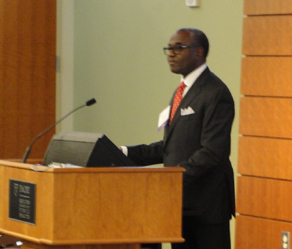
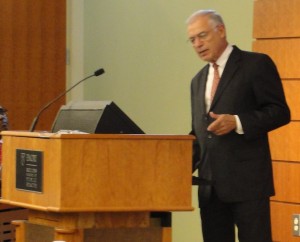
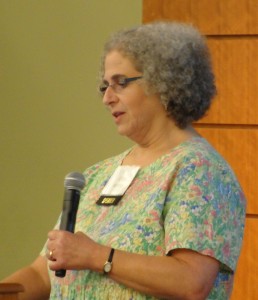
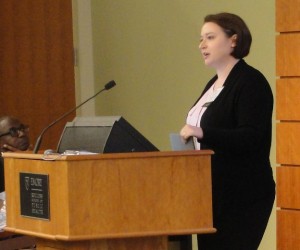
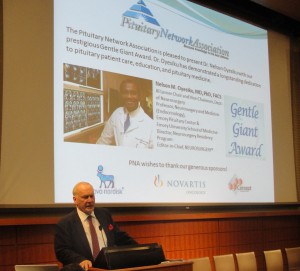
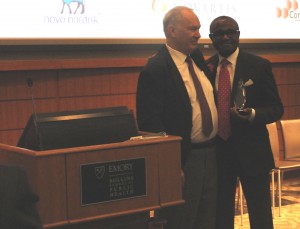
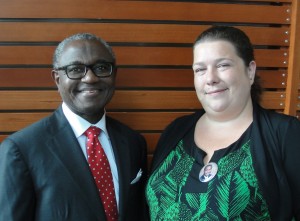
Sorry, comments are closed for this post.